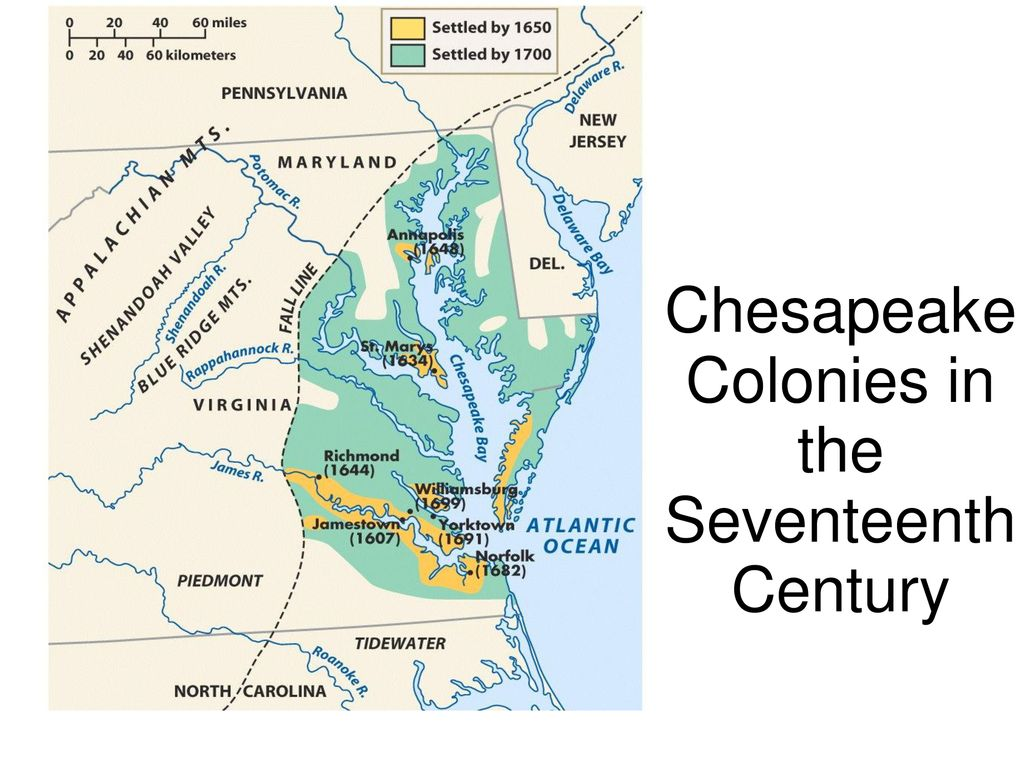Chapter 4: American Life in the Seventeenth Century
Early Chesapeake life span = v short- disease + hunger

6:1 men to women- not much procreation
Improved in late 17 century
Tobacco prolific crop in Chesapeake
Tobacco to sell planted before corn to eat
Overfarming → exhausted land → hungry for more land
1.5 mil lbs exported 1630, 40mil lbs exported/year end of century
English unemployment high → indentured servants sent over → Chesapeake relies on them for tobacco farming
Headright system- paying for indentured servant = fifty acres land
¾ of European immigrants = servants
Less good land available→ masters give smaller freedom dues → lots of poor, angry freemen
Virginia Co. took right to vote from poor freemen→ Bacon’s Revolution, 1676
Led by Nathaniel Bacon
Against allyship w/ Natives
Native attack- governor Berkeley didn’t relaiate → Baconeers (lol) did
Attacked Natives and Virginians- took over capital
Bacon suddenly died, Berkeley violently took back capital
Led Virginians to want a different labor force
7mil Africans to New World under colonial slavery, only 400,000 to NoAmerica
Most of 1600’s preferred white servants- cheaper
End of 1600’s- less desperate Englishmen to become servants, lower slave mortality, more labor demand → more slaves to Chesapeake
1698- Royal African Company loses slave monopoly → Americans cashed in → increased slave numbers
Middle passage- in between march through Africa and overworking in America, 20% death rate
Slave codes, distinguishes between white servants + black slaves
Made slaves + children property
Slavery created for economic reasons, sustained bc of racial bias
Big hierarchy formed in southern society
Highest class
Owned lots of land and slaves
The Fitzhughs, the Lees, the Washingtons, dominated House of Burgesses (Virginia govt)
Aristocratic but hardworking- businessmen
Small farmers
Biggest class
Maybe a couple slaves
Landless whites
Indentured servants
Slaves
Not many urbanized jobs- society focused on plantations
New England- family and marriage oriented
Much more positive than southern life- long lifespan
Cleaner environment→ less disease
Family moves together- very strong
Intergenerational learning
Massive birthrate
Southern men die young→women own property, not in New England
Women gained more rights than in old England, less than in south
Life in the New England towns- based on small villages and farms- similar to other colonies and Natives in area
Very focused on morals
More towns chartered by authorities → towns more planned out than southern
authorities give land to proprietors
create town hall surrounded by houses + village green for troops
Give each family enough land to sustain themselves
Incredibly educated for time
Democratic government within church turned to democratic actual government
The halfway covenant- solution to allow more people into puritanism, no report of a conversion experience required to be a member (i don’t get it either)
Concern over less religion in spreading New England→ jeremiad= new sermon type scolding for being less religious
Caused less religious devotion, but more participation
Salem witch trials- enemies targeting each other by using religious fears
property owning women often targeted
Puritan farmers intimidated by Yankee market economy
Ended with an accusation against governor’s wife
New England way of life shaped lots of America- spread their way of life around country
Land very hard to farm, rocky→ hard workers and good traders
Less slavery bc less farm work
Only attracted the most disciplined people
English abused land to get more things out of it→ felt justified taking from Natives bc they were “wasting” land
burned old growth for new growth forests for deer populations to hunt
beat paths
cleared woods for fields
introduced livestock→ sped up erosion→ increased season extremes
Lots of reliance on ocean→ great shipbuilding
Early settlers’ days and ways
Schedule revolved around farming-harvesting, planting
Men + women traditional roles
Land very cheap
English aristocrats comfortable, lower class too poor→ most colonists middle class
Classes still formed in America, less dramatic
Leisler’s Rebellion- 1689-1691
New York merchants against big rich landowners